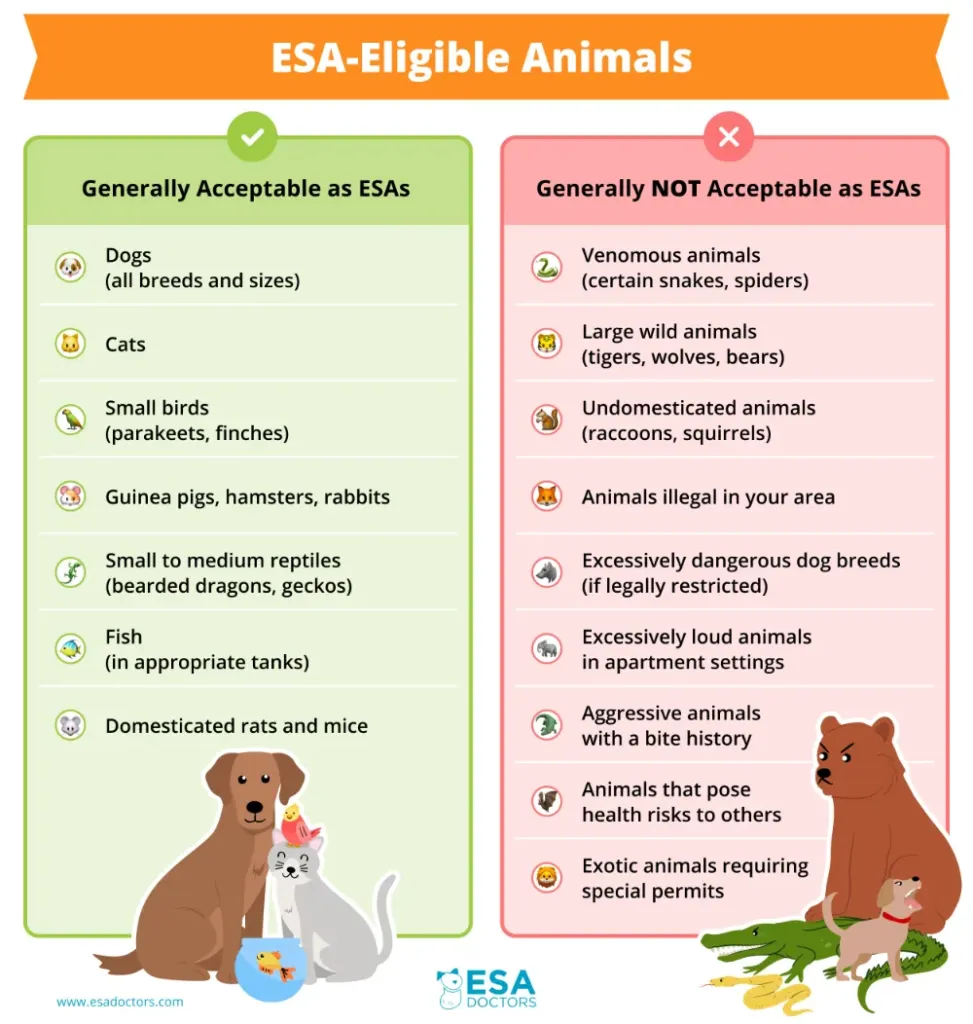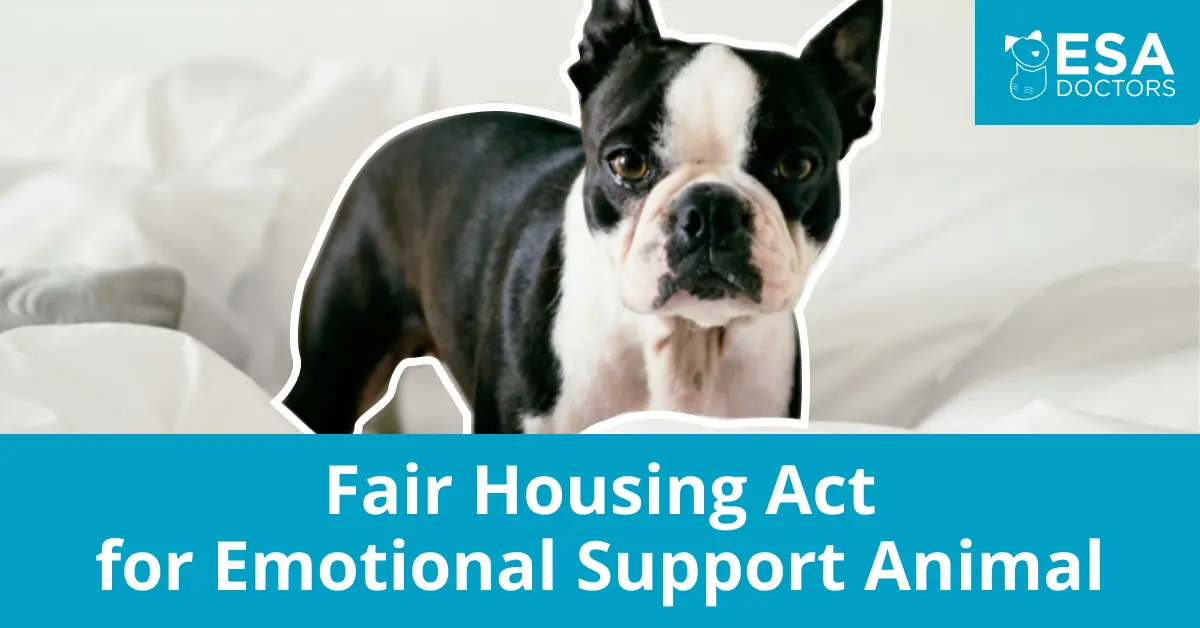Getting your pet to become an emotional support animal is easier than you might think! Unlike service dogs that need lots of special training, emotional support animals just need to help you feel better when you’re sad, scared, or worried.
Here’s a simple list of what makes an animal qualify as an emotional support animal:
- Your animal helps you feel better when you experience symptoms
- You have an ESA letter
- Your animal isn’t a danger to others
- Your animal is a typical household pet
- Your animal is legal to own where you live
Detailed Requirements for Emotional Support Animals
For an animal to qualify as an ESA, it needs to meet certain requirements that focus both on how the animal helps you and how it behaves around others:
- Helps with emotional symptoms
Your animal needs to help you feel better when you’re dealing with feelings like sadness, worry, or fear. This could mean making you feel calmer, helping you stick to daily routines, or giving you a reason to get out of bed on hard days. - Doesn’t scare or hurt other people
Your emotional support animal can’t be aggressive or dangerous to others. If your animal growls, bites, or acts in ways that make other residents in your building feel unsafe, it won’t qualify as an ESA. - Doesn’t break things or make big messes
While all animals might have accidents sometimes, your ESA shouldn’t chew through walls or cause expensive damage to where you live. - Behaves well enough that others aren’t bothered too much
Your animal doesn’t need perfect behavior, but it shouldn’t bark all night, run wild in public spaces, or create problems that would make it very hard for others to live near you. - Is a legal pet where you live
You can’t have an animal that’s against the law in your city, county, or state. For example, in some places, it’s illegal to keep certain types of snakes or birds. Those animals can’t be ESAs in those areas.
Where These ESA Requirements Come From
The rules about what animals qualify as emotional support animals come from HUD’s housing rules. These guidelines lay out the following:
- What documentation is needed (a letter from a mental health professional)
- What types of animals can qualify (common domestic animals vs. unusual species)
- When a landlord might be allowed to deny an ESA request because of the animal’s behavior
HUD’s rules try to find a fair balance between protecting people who truly need animals for mental health support, considering the needs of housing providers and other residents, and ensuring safety and reasonable accommodations for everyone
Common Animals That Make Great ESAs
While almost any domesticated animal can qualify as an emotional support animal, some types are more common than others. Here’s a look at popular ESA choices and why they work well for many people:
Dogs
Dogs are the most common emotional support animals for many good reasons:
- They form strong bonds with their owners
- They can sense mood changes and often respond to distress
- Walking them provides exercise and gets you outdoors
- Many breeds are naturally affectionate and attentive
Example: Brian has depression that sometimes makes it hard for him to get out of bed. His golden retriever, Max, needs morning walks and feeding, which gives Brian a reason to get up even on difficult days. Max also seems to sense when Brian is feeling down and will often come to sit beside him, providing comfort without Brian having to ask.
Check out our guide on some of the best dog breeds for emotional support animals.
Cats
Cats make excellent ESAs, especially for people who:
- Live in smaller spaces
- Have less energy for active play
- Enjoy quiet companionship
- Need an animal that’s more independent
Example: Sophia has social anxiety and finds large gatherings overwhelming. Her cat, Luna, comforts her when she returns home stressed from social situations. Petting Luna’s soft fur and listening to her purr help Sophia’s racing heart slow down. Since cats don’t need walks, Sophia doesn’t have to go outside when she’s feeling particularly anxious.
Small Animals
Many small animals make wonderful ESAs, including:
- Rabbits: quiet, soft, and can be litter-trained
- Guinea pigs: social, rarely bite, and make gentle sounds
- Rats: highly intelligent, can learn their names, and bond closely with owners
- Hamsters: low-maintenance and suitable for very small living spaces
Example: Marcus lives in a small apartment and works from home. His anxiety makes it hard to concentrate, but watching his two guinea pigs interact and holding them during breaks helps calm his mind. Their gentle squeaks and soft fur provide sensory comfort that allows him to refocus when work feels overwhelming.
Birds
Birds can be excellent ESAs for those who:
- Enjoy verbal interaction (with talking species)
- Find rhythmic sounds soothing
- Have limited space
- Need an animal that’s active during daytime hours
Example: Elena has PTSD and sometimes experiences flashbacks during the day. Her cockatiel, Sunny, provides distraction with his cheerful chirping and interaction. Teaching Sunny new whistles gives Elena something positive to focus on, and his consistent daytime activity helps her maintain a regular schedule.
Fish
While they might seem unusual as ESAs, fish can provide significant comfort:
- Watching fish swim can lower blood pressure and reduce anxiety
- Aquarium maintenance provides routine and purpose
- The bubbling sounds of a tank can be soothing
- They require no physical handling (good for those who can’t manage other pets)
Example: Aiden has trouble falling asleep due to racing thoughts from anxiety. The gentle bubbling of his aquarium and the rhythmic movements of his colorful betta fish help him relax at bedtime. Maintaining the tank gives him a calming ritual to perform each week, and watching the fish swim helps him practice mindfulness when his thoughts become overwhelming.
Other Animals
Less common but still effective ESAs include:
- Small reptiles: low-maintenance and calming to observe
- Pot-bellied pigs: intelligent and can form strong bonds
The best ESA is one that matches your specific needs, living situation, and the type of emotional support that helps your particular condition.

Examples of Animals That Can’t Be ESAs
Not every animal can qualify as an emotional support animal, even if it makes you feel better. Here are some types of animals that typically don’t qualify, with examples of why:
Wild Animals
You can’t have a deer, raccoon, or other wild animal as an ESA because they aren’t meant to live with people.
Example: Jamie loved feeding the squirrels in her backyard and wanted an ESA because watching them made her happy. However, wild squirrels aren’t allowed as ESAs because they might bite people, carry diseases, or destroy homes. They’re also not used to living indoors with humans, which would be stressful for them.
Wild animals often carry diseases that can spread to humans, and they typically don’t adapt well to living in homes. This is both a safety issue and an animal welfare concern.
Dangerous Animals
Animals that might hurt people can’t be ESAs, even if they help with your emotions.
Example: Max’s snake is venomous and could hurt someone if it escaped its tank. Even though Max feels calm watching his snake, it doesn’t qualify as an ESA because of the danger it could pose to neighbors, maintenance workers, or emergency personnel who might need to enter his apartment.
The law tries to balance the needs of the person with the mental health condition against reasonable safety concerns for others. An animal that poses a genuine threat to others goes beyond what’s considered a “reasonable accommodation.”
Super Disruptive Animals
Pets that make too much noise or cause big problems for neighbors might not qualify as ESAs in certain living situations.
Example: Sarah’s parrot can scream loudly for hours at a time. Even though the parrot helps Sarah feel less anxious by giving her company during the day, it might not qualify as an ESA in an apartment building with thin walls because the screaming bothers everyone else and makes it hard for them to sleep or work from home.
While landlords need to make accommodations for ESAs, they don’t have to accept situations that would cause a major disruption to other tenants’ ability to enjoy their homes. There needs to be a balance between your needs and the needs of others in shared living spaces.
Illegal Animals
If it’s against the law to own a certain type of animal where you live, it can’t be your ESA.
Example: Carlos lives in a city where it’s illegal to keep chickens within city limits due to local ordinances. Even though spending time with chickens helps Carlos with his depression, he can’t have one as an ESA in his current location because it would be breaking city law.
ESA laws don’t override local animal ordinances that exist for public health and safety reasons. These laws often exist because of concerns about noise, smell, disease, or other community impacts.
Questions You Might Have About ESA Requirements:
“Does my pet need to be trained like a service dog?”
No! This is the biggest difference between service animals and emotional support animals. Service animals need special training to help with specific tasks, but ESAs help by being themselves.
For example, service dogs like seeing-eye dogs need special training to help blind people cross streets safely or alert people with diabetes when their blood sugar is low. This training can take months or years and cost thousands of dollars. But Sam’s emotional support dog, Chowder, doesn’t need any special training. Chowder helps Sam just by being friendly and cuddly when Sam feels sad. Sam did teach Chowder basic commands like “sit” and “stay” to make him easier to live with, but this isn’t required for Chowder to be an ESA.
“Does my animal need to be a certain age to qualify as an ESA?”
No, there’s no age requirement for an emotional support animal. Both young and older animals can qualify.
“Are certain dog breeds disqualified from being ESAs?”
No, emotional support animals aren’t restricted by breed. Any dog breed can qualify as an ESA as long as the individual animal is well-behaved and doesn’t pose a threat to others.
For example, even though Jamie’s apartment building normally has breed restrictions against pit bulls, they had to make an exception for his emotional support dog because breed restrictions don’t apply to legitimate ESAs under fair housing laws.
“Does my animal need a special certification test to be an ESA?”
No, emotional support animals don’t need to pass any certification tests or courses. Unlike service animals, ESAs don’t need special training or certification.
“Does my animal need to wear a special vest or ID tag to be identified as an ESA?”
No, emotional support animals are not required to wear special identification. Vests, harnesses, ID tags, or badges are not legally required, though some owners choose to use them.
“Does my animal need to be spayed or neutered to qualify as an ESA?”
No, emotional support animals are not required to be spayed or neutered, though this is often recommended for health and behavioral reasons.
“Can my animal be disqualified from being an ESA if it barks or makes noise?”
An ESA can potentially be disqualified if it causes substantial disruption that cannot be mitigated, but occasional normal animal noises are generally acceptable. Check out our guide for what to do when your ESA barks.
“Does my ESA need to have regular veterinary check-ups to maintain its status?”
While not legally required for ESA status, regular veterinary care is strongly recommended for your animal’s well-being and may be expected as part of responsible pet ownership.
“If my animal has a minor behavior issue, can it still be an ESA?”
Yes, minor behavior issues don’t disqualify an animal from being an ESA as long as the behavior doesn’t pose a threat to others or cause significant property damage.
For example, Emma’s cat occasionally scratched furniture, which is normal cat behavior. This didn’t prevent the cat from being her ESA. Emma provided scratching posts and regularly trimmed her cat’s claws to minimize damage.
“Can I have more than one ESA, or is there a limit?”
You can have more than one ESA if each animal provides different support for your condition and your mental health professional documents this need in their letter.
For example, Taylor’s therapist documented that both his dog and bird serve as ESAs for his depression in different ways. For example, the dog encourages physical activity while the bird provides comfort during anxiety attacks. His housing provider had to accommodate both animals as a reasonable accommodation.
“Is my animal disqualified if it hasn’t lived with me for a long time?”
No, there’s no requirement for how long you need to have owned your ESA. A newly adopted animal can immediately become an ESA with proper documentation.






Can someone have two ESA’s?
Yes, you can have more than one emotional support animal.
A landlord I’m about to start a new lease with who has informed me my application for the apartment was approved and who was informed in advance about my ESA asked for my letter from my therapist. I have provided it.
Now they are asking for a certificate showing my ESA is certified. What does that even mean? There is no certificate. I received a letter from my licenced mental health professional. They accepted my security deposit and stated if I back out of the apartment I won’t get it back but now they’re saying either I give them the certificate or pay a $500 pet deposit.
What in the world is happening right now. I feel like I’m in the twilight zone. Is this even legal?!!!! They even sent me a picture of a card with a dog’s picture like an ID lol stating ESA on the top of it…… I’m really confused 🤔
The only documentation you need to qualify for an ESA is a letter from a licensed healthcare professional. You absolutely do not need a “certificate”, there is no such thing as an official legally recognized ESA certification program.
Hello, my boyfriend Chris and I have signed a One-year lease for a small rental house we are moving into this weekend, and are moving in with an ESA. We were worried we could not find a home in time for our expected moving-day agreement with our current landlord so we did not disclose we have her. We have gone through so many applications and viewings and each time denied and think it may be because we notified the landlords about our ESA, Chloe. We were told by friends and the research we did prior to applying for housing that we did not have to disclose this information, period, that we had any pets/animals/etc. so we stated we did not have any “pets.” She’s a very well behaved lazy dog and is my boyfriend’s ESA. I am worried our new landlord will have a bad taste in his mouth since we did not tell him prior to signing the lease. I feel awful about it and want to know the proper steps to inform him, I was just worried we would be homeless! :(
At this point we recommend having an honest and open discussion with your landlord about your ESA needs. Under Fair Housing rules, your landlord has to consider your ESA request whenever it comes in. The best approach is always to be friendly and take steps to address any concerns the landlord may have regarding your ESA. Good luck!
Can a 17 year old get an ESA? My parent consents and supports the idea but I’ve read that its only for 18 years and higher? Would it be possible for me to register for an ESA now?
It is possible for minors to qualify for an emotional support animal, but at this time we only assist clients who are 18+.
If I have a Certified Peer support professional with the MHA, can they authorize an ESA?
We’re not sure whether that would qualify as someone who is a licensed healthcare professional. Professionals that issue ESA recommendations are typically licensed therapists, doctors, social workers, nurses and psychiatrists.
Do I have to have my Esa cats vaccinated and do I have to give their shot records to my landlord if requested?
It is not unusual for landlords to make that request.
At what age can a dog be considered and emotional support animal, and what training is required other than the basic commands? Is there a limit on how many ESA’s one person can have?
There is no age requirement for an ESA. An ESA does not require any specific training – they provide support just through their companionship. The number of ESAs you can have depends on what your licensed healthcare professional believes is appropriate for your condition.
Can an untrained, unfixed, unlicensed, unvaccinated pitbull be licensed as an emotional support dog?
Just to clarify, emotional support animals are not “licensed”. The only way to have an official ESA is by possessing a recommendation letter from a licensed healthcare professional. ESAs do not need specialized training to address the owner’s disability, but they should be well-behaved and have basic obedience training. ESAs like all other animals are also subject to licensing requirements for animals generally in the area you live in. Landlords and airlines may also require vaccination records to ensure the animal will not pose a health problem.
Hello. I have a question. I suffer from panic attacks and anxiety, does the animal have to know certain things to be a emotional support animal? my dog Cerberus is still a puppy so I want to train him young.
Emotional support animals, unlike service animals, do not require any special training. However, it is great that you are interested in properly training your dog. All ESA owners should be as responsible as you to ensure their dogs are well behaved wherever they go and are good ambassadors for other ESA owners!
I’ve seen a couple places that say there are no age restrictions on ESA’s but is that written formally anywhere? I’ve been approved for an ESA but my property manager is trying to enforce a policy of no dogs less than one year old (which is their requirement for residents with dogs that are not ESA’s) and I’m not finding formal documentation regarding housing accommodation that talks about age restrictions.
Neither the Fair Housing Act nor guidance from the Department of Housing mentions anything about age requirements. As long as the ESA is not a threat to others, age should not be a relevant consideration.
Do I have to get a letter from a mental health doctor or can I just go see my regular doctor to get the letter?
Physicians are capable of writing ESA letters, but ESA letters generally tend to be from mental health professionals.
Me and my girlfriend are trying to get a puppy in our apartment that has a no pet policy. I suffer from severe anxiety and panic attacks and have got the ESA letter from my therapist. My landlord has handed me amendment to my lease with multiple restrictions such as weight, breed, age, that the dog be housebroken, and proof that it was neutered. I know they cannot restrict based on weight or breed but I have not been able to find any verbage on any official government documents stating that age not be a requirement or that it doesn’t have to be housebroke. I did read that it doesn’t need any specific training which might be applicable regarding house training.
Can you provide me with any citations or references regarding no age restrictions or need to be housebroke.
There is no specific reference to age of the animal in the Fair Housing Act, but landlords are only allowed to determine if the specific assistance animal in question poses a direct threat to the health and safety of others. The landlord can also reject an ESA if it causes an undue financial burden on the landlord.